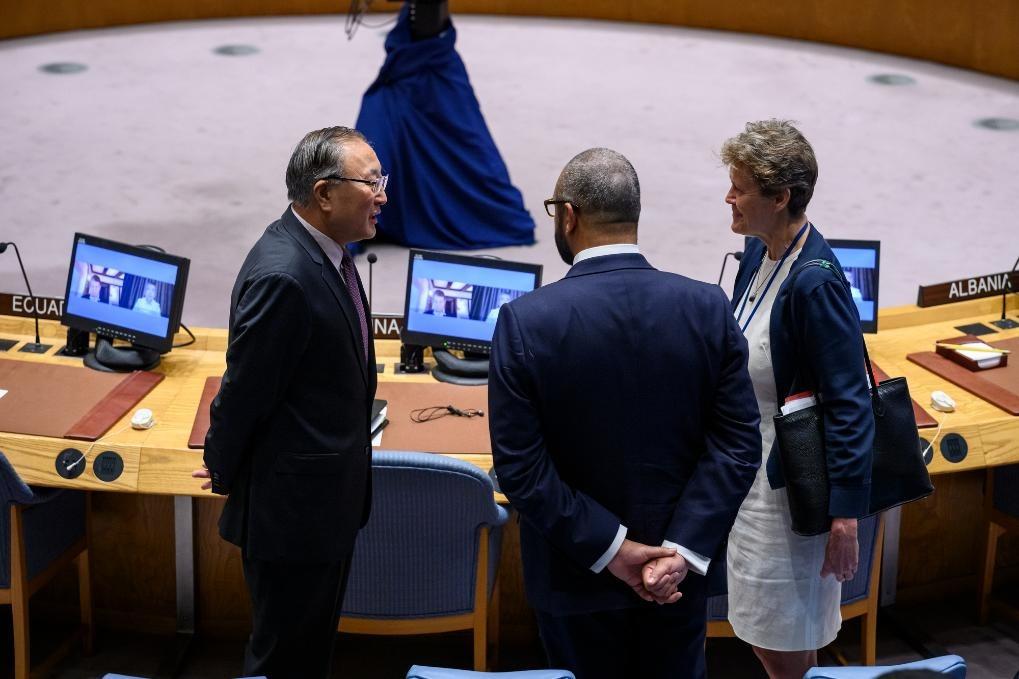 Zhang Jun (left), China's permanent representative to the United Nations, talks with other delegates before a UN Security Council briefing on artificial intelligence at the UN headquarters in New York, July 18, 2023. (PHOTO / UN / HANDOUT VIA XINHUA)
Zhang Jun (left), China's permanent representative to the United Nations, talks with other delegates before a UN Security Council briefing on artificial intelligence at the UN headquarters in New York, July 18, 2023. (PHOTO / UN / HANDOUT VIA XINHUA)
A Chinese top envoy to the United Nations on Tuesday called artificial intelligence a "double edged sword", saying that whether it is good or bad depends on how mankind uses and regulates.
The international community should engage in extensive dialogue, constantly seek consensus and explore the development of guiding principles for AI governance, Zhang Jun, China's permanent representative to the United Nations, told a UN Security Council meeting on artificial intelligence.
When it comes to AI governance, it is essential to adhere to the principle of putting ethics first, Zhang said.
"The potential impacts of AI may exceed human cognitive boundaries," the envoy said. He said that to ensure that the technology always benefits humanity, it must be people-oriented, used for good.
Efforts should be made to gradually establish and improve ethical norms, laws, regulations and policy systems for AI, while allowing countries to establish AI governance systems that are in line with their own national conditions, based on their own development stages and social and cultural characteristics, said Zhang Jun, China's permanent representative to the United Nations
Zhang said that efforts should be made to gradually establish and improve ethical norms, laws, regulations and policy systems for AI, while allowing countries to establish AI governance systems that are in line with their own national conditions, based on their own development stages and social and cultural characteristics.
He said it is vital to adhere to safety and controllability. The development and application of AI-related technologies entail many uncertainties, and safety is the bottom line that must be upheld, he emphasized.
"The international community should strengthen risk awareness, establish effective risk warning and response mechanisms, and ensure that risks beyond human control do not occur; machines do not autonomously cause harm; and humans have the ability to press the stop button at critical moments," he said.
Zhang said it is important to insist on fairness and inclusiveness.
"Equal access and utilization of AI technology products and services by developing countries are crucial to bridging the technological, digital and development divides between the north and the south," he said.
Zhang called on the international community to work together to ensure that developing countries enjoy the development dividends brought by AI technology and continuously enhance their representation, voice and rights of decision-making in the field.
"A certain developed country, in order to seek technological hegemony, seeks to build exclusive small clubs with various excuses and actions, maliciously obstruct the technological development of other countries and artificially create technological barriers," said Zhang. "China firmly opposes these behaviors."
ALSO READ: UN Security Council to hold first talks on AI risks
Zhang said it is also necessary to adhere to openness and inclusiveness. "The development of science and technology needs to achieve a relative balance between technological progress and safe applications," he said.
"The best path is to maintain open cooperation, encourage interdisciplinary, inter-industrial, inter-regional, and cross-border exchanges and dialogues, and oppose various forms of exclusive clubs, decoupling and disconnection," Zhang said.
He said there also should be commitment to peaceful utilization.
"The fundamental purpose of developing AI technologies is to enhance the common well-being of humanity. Therefore, it is necessary to focus on exploring the potential of AI in promoting sustainable development, promoting cross-disciplinary integration and innovation, and better empowering the global development cause."
He urged the Security Council to delve into the application and impact of AI in conflict situations and to take steps to enrich the UN peace toolbox.
"AI in the military field may lead to major changes in the way of warfare and the format of war," Zhang said, adding that all countries should uphold a responsible defense policy, oppose the use of AI to seek military hegemony or to undermine the sovereignty and territorial integrity of other countries, and avoid the abuse, unintentional or even intentional misuse of AI weapons systems.
READ MORE: Firms racing to meet AI tech challenge
UN Secretary-General Antonio Guterres said Tuesday that he was "shocked and impressed" by the newest form of AI — generative AI — a radical advance in its capabilities.
"Generative AI has enormous potential for good and evil at scale. Its creators themselves have warned that much bigger, potentially catastrophic and existential risks lie ahead," Guterres said.
"Without action to address these risks, we are derelict in our responsibilities to present and future generations," he said.


